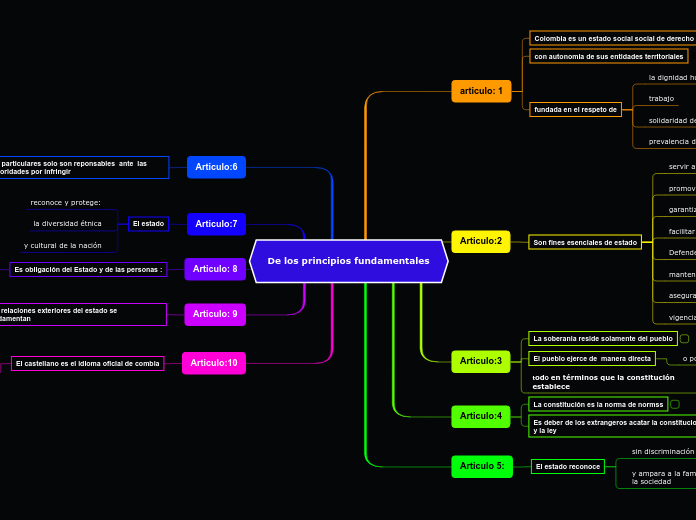af Nelcy Rodriguez 4 år siden
223
De los principios fundamentales

af Nelcy Rodriguez 4 år siden
223

Mere som dette
The part of speech is a category to which a word is assigned according to its syntactic functions. In English the main parts of speech are noun, pronoun, adjective, determiner, verb, adverb, preposition, conjunction, and interjection.
A conjunction is a word like 'if' 'but' or 'and' which is used to connect sentences or clauses together.
Subordinating conjunctions are conjunctions that are used at the beginning of subordinate clauses. Some examples of these conjunctions are: although, after, before, because, how, if, once, since, so that, until, unless, when etc.
A preposition is one of the most exciting parts of grammar. A preposition is used to describe the location of something in relation to something else.
Compound preposition consists of two or more words.
An interjection is used to express emotion in a sentence.
Think of other interjections!
An adverb is used to describe a verb, but it can also describe an adjective or another adverb.
Adverbs normally help paint a fuller picture by describing how something happens.
A numeral is a word or phrase that describes a numerical quantity.
Some theories of grammar use the word 'numeral' to refer to cardinal numbers that act as a determiner to specify the quantity of a noun, for example the 'two' in 'two hats'.
An article is a word used to modify a noun, which is a person, place, object, or idea. Technically, an article is an adjective, which is any word that modifies a noun.
It refers directly to a specific noun or groups of nouns.
A pronoun is a word that can be used in place of a noun, typically after the noun itself has already been stated.
Interrogative pronouns are used in questions. Although they are classified as pronouns, it is not easy to see how they replace nouns. Who, which, what, where, and how are all interrogative pronouns.
Reciprocal pronouns are used for actions or feelings that are reciprocated. The reciprocal pronouns are each other and one another.
An adjective is a word that's used to describe a specific noun and to provide more detail to the listener.
Superlative adjectives demonstrate a higher level of comparison between entities.
Expresses a comparison between two entities or groups of entities in quality or degree.
A noun is defined as a person, place, thing or idea. Proper nouns always begin with a capital letter. Common nouns, which are general words, such as 'cars,' are not capitalized.
Proper nouns are the names of specific people or places. They should always begin with a capital letter.
A verb is an action word or 'doing' word that signifies movement in some way.
A participle is a verb form that can be used as an adjective or to create a verb tense. There are two types of participles: Present participle (ending -ing) and Past participle (usually ending -ed, -d, -t, -en, or -n).
jsdjsjdassjdnj<sndds<djnsnndndndn
A modal is a type of auxiliary (helping) verb that is used to express: ability, possibility, permission or obligation. The main modal verbs in the English language are: can, could, may, might, must, shall, should, will, would.
A verb with its own meaning: a verb that is not an auxiliary verb.